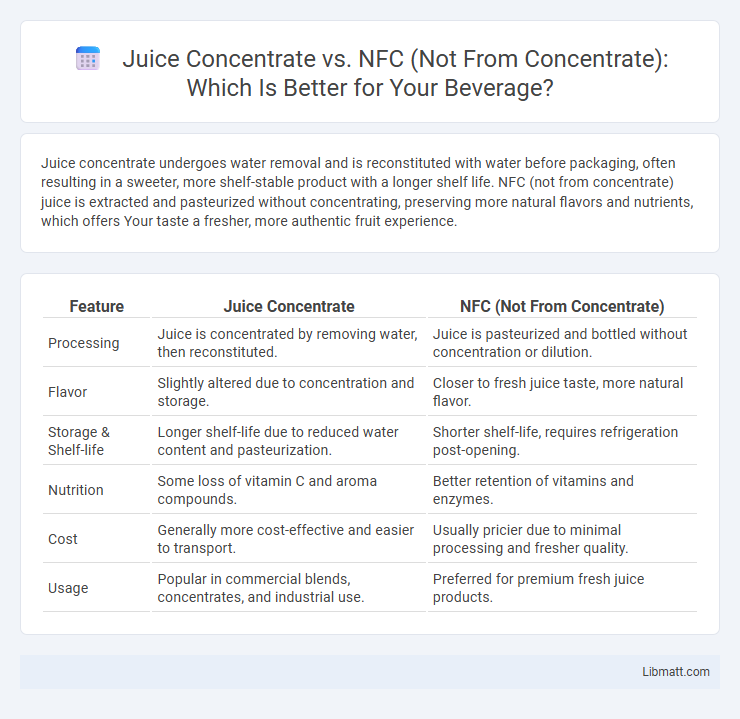Juice concentrate undergoes water removal and is reconstituted with water before packaging, often resulting in a sweeter, more shelf-stable product with a longer shelf life. NFC (not from concentrate) juice is extracted and pasteurized without concentrating, preserving more natural flavors and nutrients, which offers Your taste a fresher, more authentic fruit experience.
Table of Comparison
| Feature | Juice Concentrate | NFC (Not From Concentrate) |
|---|---|---|
| Processing | Juice is concentrated by removing water, then reconstituted. | Juice is pasteurized and bottled without concentration or dilution. |
| Flavor | Slightly altered due to concentration and storage. | Closer to fresh juice taste, more natural flavor. |
| Storage & Shelf-life | Longer shelf-life due to reduced water content and pasteurization. | Shorter shelf-life, requires refrigeration post-opening. |
| Nutrition | Some loss of vitamin C and aroma compounds. | Better retention of vitamins and enzymes. |
| Cost | Generally more cost-effective and easier to transport. | Usually pricier due to minimal processing and fresher quality. |
| Usage | Popular in commercial blends, concentrates, and industrial use. | Preferred for premium fresh juice products. |
Introduction to Juice Concentrate and NFC Juices
Juice concentrate is produced by removing water content from fruit juice through evaporation, resulting in a dense, shelf-stable product that is reconstituted by adding water before consumption. NFC (Not From Concentrate) juices undergo minimal processing and are typically pasteurized fresh juices that retain more of the original flavor and nutritional profile. Both juice concentrate and NFC offer distinct advantages depending on storage, flavor preservation, and consumer preferences.
What Is Juice Concentrate?
Juice concentrate is a product made by removing water from fresh fruit juice, resulting in a thicker, more concentrated form with extended shelf life and reduced volume for easier storage and transport. Unlike NFC (Not From Concentrate) juice, which is pasteurized but retains the original liquid form without water removal, juice concentrate often undergoes reconstitution by adding water back before packaging. Your choice between juice concentrate and NFC depends on preferences for taste intensity, freshness, and processing methods.
What Does NFC (Not From Concentrate) Mean?
NFC (Not From Concentrate) juice means the juice is extracted directly from fresh fruit and then pasteurized without removing water content, preserving more natural flavor and nutrients compared to concentrate juices. Unlike juice concentrate, which is watered down after evaporation and storage, NFC retains the original water ratio, offering a fresher taste closer to freshly squeezed fruit. Choosing NFC juice ensures your beverage is less processed, maintaining higher nutritional quality and authentic fruit essence.
Key Differences Between Concentrate and NFC Juices
Juice concentrate is produced by evaporating water from the juice, resulting in a thicker syrup that is later reconstituted by adding water, which can affect flavor and nutrient levels. NFC (Not From Concentrate) juice undergoes minimal processing, preserving more of the natural taste, aroma, and nutritional content of fresh fruit. Your choice between concentrate and NFC depends on whether you prioritize shelf life and cost savings or a fresher, more authentic drinking experience.
Nutritional Value Comparison
Juice concentrate often undergoes heating and evaporation processes that can reduce certain heat-sensitive nutrients, such as vitamin C and some antioxidants, while NFC (Not From Concentrate) juice retains more of the original fruit's nutritional profile due to minimal processing. NFC juice preserves natural enzymes, vitamins, and phytochemicals better, providing a fresher and potentially more nutrient-rich option. When choosing juice for health benefits, your best option is NFC juice to maximize intake of essential nutrients.
Flavor and Quality: Which Tastes Better?
Juice concentrate undergoes heat evaporation to remove water, which can alter its natural flavor and slightly diminish quality compared to NFC (Not From Concentrate) juice, which is pasteurized but retains more original fruit flavors and aroma. NFC juice typically provides a fresher, more vibrant taste profile that closely resembles freshly squeezed juice, making it preferable for consumers prioritizing authentic flavor. While concentrate offers longer shelf life and cost effectiveness, NFC is often associated with superior sensory quality and richer nutritional content.
Processing Methods for Both Juice Types
Juice concentrate undergoes a process where water is evaporated from the fresh juice, reducing its volume for easier storage and transport, and then reconstituted by adding water back before consumption. Not From Concentrate (NFC) juice is produced through pasteurization without removing water, preserving more of the natural flavor and nutritional profile. Both methods use heat treatment for preservation, though NFC generally retains fresher characteristics due to minimal processing.
Shelf Life and Storage Considerations
Juice concentrate typically boasts a longer shelf life due to reduced water content, allowing it to withstand extended storage periods without significant quality loss. NFC (Not From Concentrate) juice, retaining its natural water content, requires refrigeration and has a shorter shelf life, usually lasting about 7-14 days after opening. Proper airtight packaging and cold storage are essential for both types to preserve flavor, nutrients, and safety.
Environmental Impact and Sustainability
Juice concentrate requires less volume for transportation and storage, resulting in lower carbon emissions and reduced packaging waste compared to Not From Concentrate (NFC) juices. However, the reconstitution process and energy consumption in producing concentrate can offset some environmental benefits. NFC juices retain more natural components, but typically involve higher logistics costs and a larger carbon footprint due to their bulkier, high-water-content shipments.
Which Juice Type Is Better for You?
Juice concentrate undergoes water removal and re-addition, concentrating flavors but potentially reducing nutrient levels compared to NFC (not from concentrate) juice, which is minimally processed and retains more natural vitamins and antioxidants. NFC juice generally provides better nutritional value due to less heat exposure and fewer additives, making it a healthier choice for those seeking natural benefits. However, juice concentrate may offer longer shelf life and affordability, appealing to consumers prioritizing cost and storage convenience.
Juice concentrate vs NFC (not from concentrate) Infographic

 libmatt.com
libmatt.com